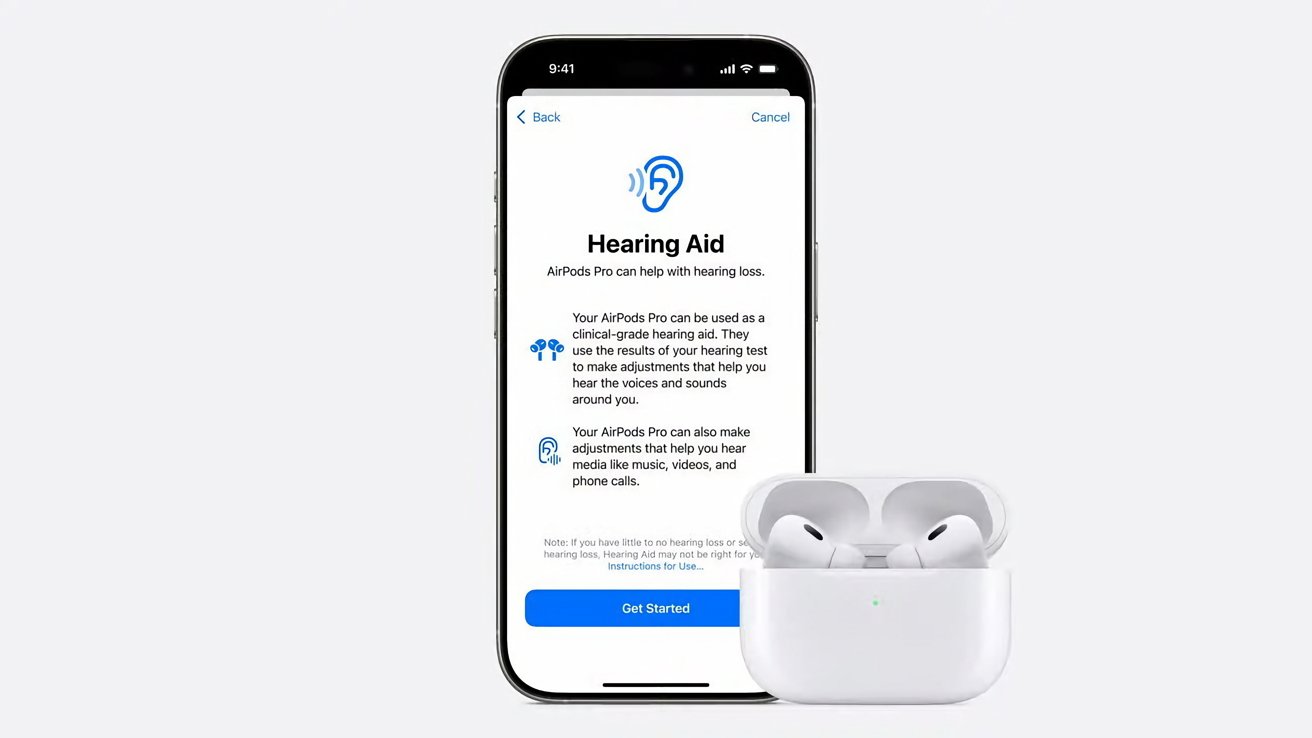The first reviews of the AirPods Pro 2 hearing features are out, and they also confirm that the launch is to be before the end of October.
Reviewers are all saying no more than "next week," but this is in line with the expected October 28, 2024 release of iOS 18.1. Overall, reviewers are also all saying that the hearing test in particular is impressive.
"At times, the experience has been emotionally intense," said Chris Welch in The Verge. "But this is a big milestone — and it seems inevitable that Samsung, Google, and other tech heavyweights will follow Apple's lead fairly quickly."
The test can be taken as many times as desired, and it is programmed to be different for each time. The principle is that the user presses a button whenever they hear a tone, but that tone, and the overall sequence of tones, changes with every test.
"For those who don't know they have hearing loss — or have always wondered — Apple's new test can reveal potentially life-changing insights," wrote Nicole Nguyen in the Wall Street Journal. "Untreated hearing loss increases the risk of social isolation and dementia."
"I say (okay, I whisper) this emphatically and urgently," says Liz Plosser of Women's Health. "The device is worth the investment because it could positively impact your hearing for the rest of your life."
It's not all positive
Every reviewer so far has praised the effectiveness of the hearing test, but most also have some criticisms. The test itself requires the wearer to be in a quiet place and some workers struggled to find one quiet enough.
Then there were some like Nguyen who point out that the AirPods "are fussier than traditional hearing aids and might not be the best option for people who've never worn them before."
Nguyen is thinking chiefly of more elderly people, and notes that AirPods and their case are small, so the wearer needs dexterity to be able to handle them."
For all users, Nguyen points out that "the adjustments are buried in the iPhone's Settings app and only show up when AirPods are connected." Plus there is an issue over battery life.
"The [AirPods] Pros can last up to six hours," writes Nguyen, "[while] Yauman's prescription hearing aids, Jabra's Enhance Pro 20, only need to be charged about every 30 hours— on par with competitors."
Apple announced at the September 2024 iPhone launch that AirPods Pro 2 would gain what it described as clinical-grade hearing aid features. Once a user has taken the test, the AirPods Pro adjust their audio output to try addressing any issues.
 William Gallagher
William Gallagher







-m.jpg)






 Christine McKee
Christine McKee
 Charles Martin
Charles Martin
 Mike Wuerthele
Mike Wuerthele
 Marko Zivkovic
Marko Zivkovic
 Malcolm Owen
Malcolm Owen





-m.jpg)






8 Comments
AirPods too small as a hearing aid? If i remember what my grandma used to have - case smaller as ring case and the hearing aid itself was the size of a very small bean… no stalks or anything… so i’d say the size may be quite an improvement for somw
What an odd criticism to criticize the 6 hour battery life in a device where hearing aid as a new feature added to devices people already own.
It only takes 5 minutes to add an hour of charge. Or you can buy two AirPods pros for well less than half of the price of one Jamba Enhanced Pro 20 and swap them every 6 hours and don't have to pay for appointments to get and configure the device.
So many people are going to have improved hearing who didn't know they had hearing loss.
I am confused, though, by Apple's naming. Is there a new AirPods Pro 2, or is this a feature added to the existing AirPods Pro 2? Are all AirPods Pro 2 with the USB-C port the same?
Seriously think the reviewer is completely off base with his criticism of the size of the AirPods. AirPods are much larger and easier to use than any hearing aid on the market. Some of the hearing aids are nearly impossible to handle by an elderly person. This is why listening to or reading reviews is in many cases completely useless.
I got Rexton in-ear aids at Costco in February. They are much smaller than AirPods and require frequent changing of a tiny (slightly bigger than B-B gun ammo) battery—one side or the other every couple of days. Very fiddly. Synching the changing of batteries not feasible due to my hearing loss being unequal—one side set to higher volume that uses more power. The directional adjustments via an app on my iPhone are pretty ineffective. Only volume and L/R balance really work.
I chose this type because of vanity, they are basically invisible, knowing that sound quality and battery life would suffer. So, no criticism of Rexton. They work pretty well overall, considering. But the high frequencies (where my loss is) can sound annoyingly tinny due to the miniscule speakers under certain circumstances. Also, my sense of audio directionality gets hosed—can hear birds I never heard before, but where they are is a mystery!
“